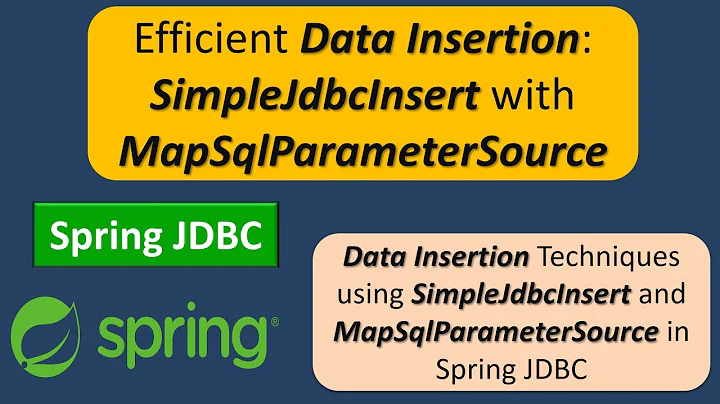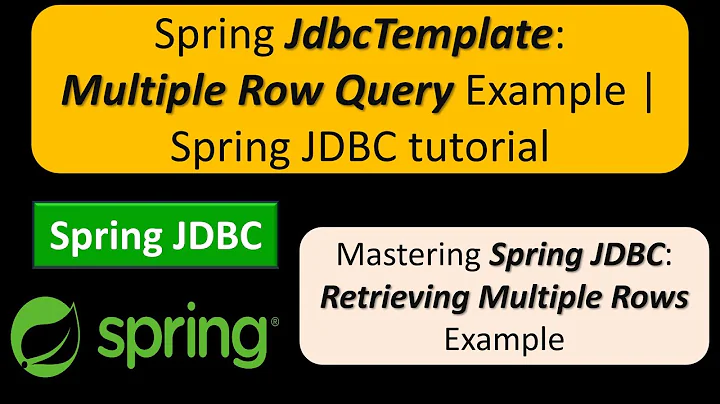Seeing the underlying SQL in the Spring JdbcTemplate?
Solution 1
The Spring documentation says they're logged at DEBUG level:
All SQL issued by this class is logged at the DEBUG level under the category corresponding to the fully qualified class name of the template instance (typically JdbcTemplate, but it may be different if you are using a custom subclass of the JdbcTemplate class).
In XML terms, you need to configure the logger something like:
<category name="org.springframework.jdbc.core.JdbcTemplate">
<priority value="debug" />
</category>
This subject was however discussed here a month ago and it seems not as easy to get to work as in Hibernate and/or it didn't return the expected information: Spring JDBC is not logging SQL with log4j This topic under each suggests to use P6Spy which can also be integrated in Spring according this article.
Solution 2
This works for me with org.springframework.jdbc-3.0.6.RELEASE.jar. I could not find this anywhere in the Spring docs (maybe I'm just lazy) but I found (trial and error) that the TRACE level did the magic.
I'm using log4j-1.2.15 along with slf4j (1.6.4) and properties file to configure the log4j:
log4j.logger.org.springframework.jdbc.core = TRACE
This displays both the SQL statement and bound parameters like this:
Executing prepared SQL statement [select HEADLINE_TEXT, NEWS_DATE_TIME from MY_TABLE where PRODUCT_KEY = ? and NEWS_DATE_TIME between ? and ? order by NEWS_DATE_TIME]
Setting SQL statement parameter value: column index 1, parameter value [aaa], value class [java.lang.String], SQL type unknown
Setting SQL statement parameter value: column index 2, parameter value [Thu Oct 11 08:00:00 CEST 2012], value class [java.util.Date], SQL type unknown
Setting SQL statement parameter value: column index 3, parameter value [Thu Oct 11 08:00:10 CEST 2012], value class [java.util.Date], SQL type unknown
Not sure about the SQL type unknown but I guess we can ignore it here
For just an SQL (i.e. if you're not interested in bound parameter values) DEBUG should be enough.
Solution 3
I use this line for Spring Boot applications:
logging.level.org.springframework.jdbc.core = TRACE
This approach pretty universal and I usually use it for any other classes inside my application.
Solution 4
Parameter values seem to be printed on TRACE level. This worked for me:
log4j.logger.org.springframework.jdbc.core.JdbcTemplate=DEBUG, file
log4j.logger.org.springframework.jdbc.core.StatementCreatorUtils=TRACE, file
Console output:
02:40:56,519 TRACE http-bio-8080-exec-13 core.StatementCreatorUtils:206 - Setting SQL statement parameter value: column index 1, parameter value [Tue May 31 14:00:00 CEST 2005], value class [java.util.Date], SQL type unknown
02:40:56,528 TRACE http-bio-8080-exec-13 core.StatementCreatorUtils:206 - Setting SQL statement parameter value: column index 2, parameter value [61], value class [java.lang.Integer], SQL type unknown
02:40:56,528 TRACE http-bio-8080-exec-13 core.StatementCreatorUtils:206 - Setting SQL statement parameter value: column index 3, parameter value [80], value class [java.lang.Integer], SQL type unknown
Solution 5
This worked for me with log4j2 and xml parameters:
<?xml version="1.0" encoding="UTF-8"?>
<Configuration status="debug">
<Properties>
<Property name="log-path">/some_path/logs/</Property>
<Property name="app-id">my_app</Property>
</Properties>
<Appenders>
<RollingFile name="file-log" fileName="${log-path}/${app-id}.log"
filePattern="${log-path}/${app-id}-%d{yyyy-MM-dd}.log">
<PatternLayout>
<pattern>[%-5level] %d{yyyy-MM-dd HH:mm:ss.SSS} [%t] %c{1} - %msg%n
</pattern>
</PatternLayout>
<Policies>
<TimeBasedTriggeringPolicy interval="1"
modulate="true" />
</Policies>
</RollingFile>
<Console name="console" target="SYSTEM_OUT">
<PatternLayout
pattern="[%-5level] %d{yyyy-MM-dd HH:mm:ss.SSS} [%t] %c{1} - %msg%n" />
</Console>
</Appenders>
<Loggers>
<Logger name="org.springframework.jdbc.core" level="trace" additivity="false">
<appender-ref ref="file-log" />
<appender-ref ref="console" />
</Logger>
<Root level="info" additivity="false">
<appender-ref ref="file-log" />
<appender-ref ref="console" />
</Root>
</Loggers>
</Configuration>
Result console and file log was:
JdbcTemplate - Executing prepared SQL query
JdbcTemplate - Executing prepared SQL statement [select a, b from c where id = ? ]
StatementCreatorUtils - Setting SQL statement parameter value: column index 1, parameter value [my_id], value class [java.lang.String], SQL type unknown
Just copy/past
HTH
Related videos on Youtube
Artem
Updated on July 05, 2022Comments
-
Artem almost 2 years
I am learning about the wonders of JdbcTemplate and NamedParameterJdbcTemplate. I like what I see, but is there any easy way to see the underlying SQL that it ends up executing? I'd like to see this for debug purposes (in order to for example debug the resulting SQL in an outside tool).
-
Artem over 14 yearsTo clarify, I'd like to see the SQL with the '?' inside to make sure that whole process worked correctly.
-
Krithika Vittal over 10 yearsHi Artem,Did u achieve this in your code ?
-
Janac Meena over 3 yearsIf using Intellij Debugger, press double shift, enter this: org.springframework.jdbc.core.namedparam.NamedParameterJdbcTemplate#query(java.lang.String, org.springframework.jdbc.core.namedparam.SqlParameterSource, org.springframework.jdbc.core.RowMapper<T>)
-
-
BalusC over 14 yearsThat the
PreparedStatement#toString()would return the SQL string is nowhere specified in JDBC API and is thus an implementation detail. You're dependent on the JDBC driver make and/or version whether it works or not. -
Bob about 12 yearsThe link referenced in your comment to rkbloom.net/logdriver appears to be dead now. can you provide any more details about this logger - I can't find any reference to it on the parent site. Thanks
-
Verhagen over 11 yearsUse as name "org.springframework.jdbc", to also see the real SQL queries.
-
Emilio over 10 yearsI think this may work with jdbc, but no jdbctemplate. Not working for me too
-
Marged over 8 yearsFor me this is working with Spring 4.2.4 and
JdbcTemplate -
 Marina over 6 yearsit also worked great with logback: <logger name="org.springframework.jdbc.core" level="TRACE"> <appender-ref ref="your-appender-ref" /> </logger>
Marina over 6 yearsit also worked great with logback: <logger name="org.springframework.jdbc.core" level="TRACE"> <appender-ref ref="your-appender-ref" /> </logger> -
nanosoft almost 6 yearsLink which contained the solution doesn't work so is the solution so down-voting.
-
nanosoft about 4 yearsI used <Logger name="org.springframework.jdbc.core.JdbcTemplate" level="trace" additivity="false"> <AppenderRef ref="rollingFileApp" /> </Logger>
-
Stunner over 3 yearsplease let me know at the annotation leve.. i don't have any xml or property file..
-
Stunner over 3 years2020 is all about annotations fortunately or unfortunately
-
 Vladislav Kysliy over 3 yearsI think there is no way to do this with annotations, only property file or logback.xml. I even can't imagine why this should be available at the annotation level
Vladislav Kysliy over 3 yearsI think there is no way to do this with annotations, only property file or logback.xml. I even can't imagine why this should be available at the annotation level -
 Vishal almost 3 yearsWhat if I want to see multiline SQL into single log statement?
Vishal almost 3 yearsWhat if I want to see multiline SQL into single log statement?











